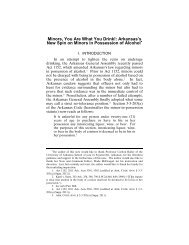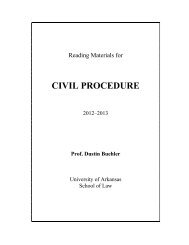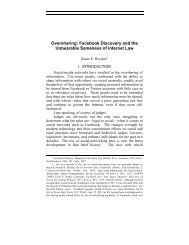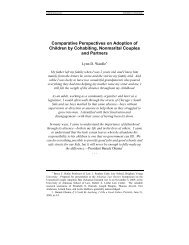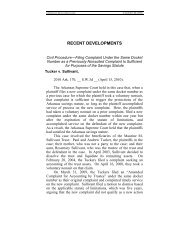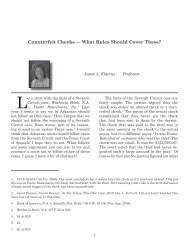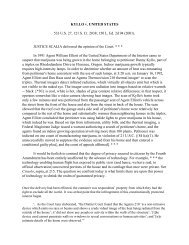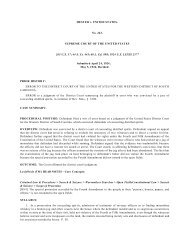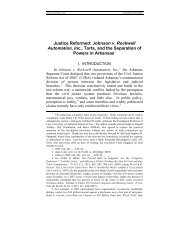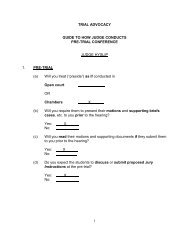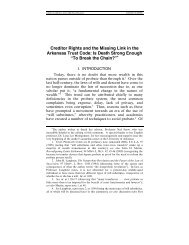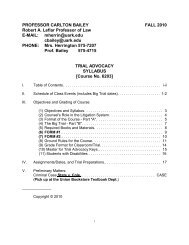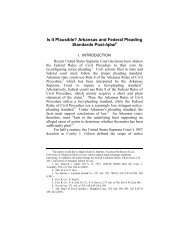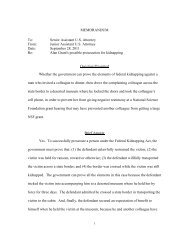PAYTON v. NEW YORK
PAYTON v. NEW YORK
PAYTON v. NEW YORK
You also want an ePaper? Increase the reach of your titles
YUMPU automatically turns print PDFs into web optimized ePapers that Google loves.
to announce their purpose before entering the apartment as required by the statute.<br />
On March 14, 1974, Obie Riddick was arrested for the commission of two armed robberies that<br />
had occurred in 1971. He had been identified by the victims in June 1973, and in January 1974<br />
the police had learned his address. They did not obtain a warrant for his arrest. At about noon on<br />
March 14, a detective, accompanied by three other officers, knocked on the door of the Queens<br />
house where Riddick was living. When his young son opened the door, they could see Riddick<br />
sitting in bed covered by a sheet. They entered the house and placed him under arrest. Before<br />
permitting him to dress, they opened a chest of drawers two feet from the bed in search of<br />
weapons and found narcotics and related paraphernalia. Riddick was subsequently indicted on<br />
narcotics charges. At a suppression hearing, the trial judge held that the warrantless entry into his<br />
home was authorized by the revised New York statute, and that the search of the immediate area<br />
was reasonable under Chimel v. California, 395 U.S. 752<br />
The New York Court of Appeals, in a single opinion, affirmed the convictions of both Payton<br />
and Riddick.<br />
Before addressing the narrow question presented by these appeals, n19 we put to one side other<br />
related problems that are not presented today. Although it is arguable that the warrantless entry<br />
to effect Payton's arrest might have been justified by exigent circumstances, none of the New<br />
York courts relied on any such justification. The Court of Appeals majority treated both Payton's<br />
and Riddick's cases as involving routine arrests in which there was ample time to obtain a<br />
warrant, n20 and we will do the same. Accordingly, we have no occasion to consider the sort of<br />
emergency or dangerous situation, described in our cases as "exigent circumstances," that would<br />
justify a warrantless entry into a home for the purpose of either arrest or search.<br />
Nor do these cases raise any question concerning the authority of the police, without either a<br />
search or arrest warrant, to enter a third party's home to arrest a suspect. The police broke into<br />
Payton's apartment intending to arrest Payton, and they arrested Riddick in his own dwelling. We<br />
also note that in neither case is it argued that the police lacked probable cause to believe that the<br />
suspect was at home when they entered. Finally, in both cases we are dealing with entries into<br />
homes made without the consent of any occupant. In Payton, the police used crowbars to break<br />
down the door and in Riddick, although his 3-year-old son answered the door, the police entered<br />
before Riddick had an opportunity either to object or to consent.<br />
II<br />
The simple language of the Amendment applies equally to seizures of persons and to seizures of<br />
property. Our analysis in this case may therefore properly commence with rules that have been<br />
well established in Fourth Amendment litigation involving tangible items. As the Court<br />
reiterated just a few years ago, the "physical entry of the home is the chief evil against which the<br />
wording of the Fourth Amendment is directed. " United States v. United States District Court,<br />
407 U.S. 297, 313. And we have long adhered to the view that the warrant procedure minimizes<br />
the danger of needless intrusions of that sort.<br />
The majority of the New York Court of Appeals, however, suggested that there is a substantial



